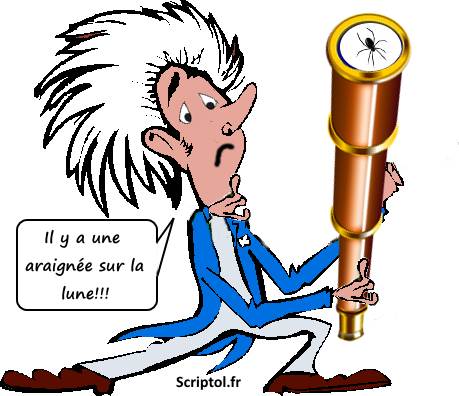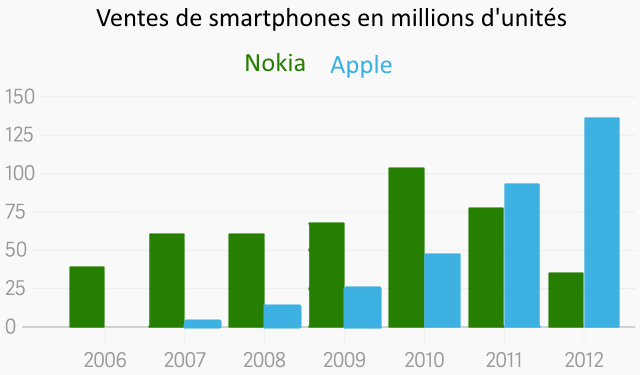Silicon Valley visionaries
The main web companies were launched by default: No firm created wanted to commercialize the idea of inventors, so they had to create their own business...
A visionary is someone who stands in the face of a new product and knows it will take off. But many of the products that really became them were offered primarily to companies that did not see a future there. There are no visionaries in established companies, it has even become Apple's business since it lost Steve Jobs.

HP and Atari did not believe in PC
It was in March 1976 that young Wozniak fulfilled the plans of Apple I, which he proudly shows to members of his computer club Homebrew Computer Club. His intention was to distribute the schemes for free, but young Jobs, who was present, sees the potential of such a machine and encourages Wozniak to sell his idea rather, who did not even think about it. Then Wozniak presents the project to his employer Hewlett-Packard. The latter considers the idea exciting, but has not seen how HP can sell such a product. (Note that HP later became the main PC manufacturer). Jobs, who worked for Atari, a video game company, in turn shows the diagrams to his employer, who also does not see the point in producing this device (Atari will also produce personal computers later).
In desperation, both hobbyists sell one van sound, the other their sophisticated calculator, and found Apple .
Altavista was pleased with his algorithm
Two Stanford mathematics students, Larry Page and Sergey Brin, develop the PageRank algorithm in 1996), which classifies search engine pages by the number and quality of links it receives from other pages. The quality of each page is evaluated by the number of links received. This gives a rather complex formula.
They are conducting an experimental search, but their aspiration was to become teachers, so they decide to sell the code to one of the installed search engines.
AltaVista was the most popular at the time in 1997, and it classified pages by the number of keyword instances. It goes without saying that it was quite easy to distort the results by "stuffing keywords," a practice that, by the way, existed for a long time after it showed its inefficiency... but folk beliefs have a hard life.
Both students offered their project to all search engines of that time - Altavista, Affite, Yahoo!, Lycos, Infoseek. According to the former head of this company, it was offered to Excit for 350 thousand dollars. The suggestion that she refused, like everyone else .
In desperation, in 1997 they submitted the domain name Google, and in 1998 they founded their own company. Since then, Altavista and the rest have disappeared, except for Yahoo, which has only a marginal market share.
Now Google costs a little more than $350 thousand!
Yahoo: Buying, sabotaging, closing
Geocities was founded in 1994 and was one of the first social facilities. Indeed, it hosted sites classified by region and center of interest. We visited cities. Only one thing was missing - to allow contact between visitors. But Yahoo would not have implemented it. Having bought the domain for more than $3 billion, the company removed the social side in order to keep only the hosting, which brought money using an advertising bandage. Geocities was closed in 2009, as were many other sites bought by the firm.
She also bought the Broadcast.com for $5.7 billion before closing the service a few years later.
Google has not seen the appearance of Facebook
Google owned a social site like Facebook called Orkut, which was created by an employee and launched by Google on January 22, 2004 (Facebook was founded on February 2, 2004). It was one of the leading social networks, but was not sufficiently developed, which allowed Facebook to gain the importance that it has. Former head of the company Eric Schmidt admits that he completely missed the train on social networks.
Most surprisingly, while MySpace was bought in July 2005 by Robert Murdoch for $580 million, Google in 2006 signed a partnership to exchange advertising revenue for use as a search engine by users for $900 million. Buying MySpace would be cheaper, but apparently Google does not see a future in these social networks... Things have changed since then.
Nokia saw a gadget in the iPhone
On April 17, 2008, Nokia shares lose 10% of their value. Citigroup analysts are concerned about the absurdity of the new product. The company announces it won't launch a touchscreen in response to Apple and its iPhones until the end of the year. Director Olli-Pekka Kallasvuo denies that Nokia needs to compete with the iPhone:
"It's a niche product."

Perhaps he trusted this article in Bloomberg, which in 2007 confidently announced that the iPhone is a luxury product intended only for a few gadget lovers!

The future seen by Nokia in 2009: Morph is the result of a collaboration between Nokia and Cambridge. Nice, but not quite so developed smartphones.
Microsoft lags behind all trains: internet, search, social network, cartography, smartphone
In not one, but several major cases, Microsoft has shown its lack of long-term vision...
In 1995, 90% of Internet users used the Netscape browser when Microsoft finally decided to respond and offered Internet Explorer. Thanks to Windows support, IE, in turn, reached 95% of the market share as of 2003.
Later successor to NetScape, Firefox ended this dominance. Microsoft completely missed the internet train, as it did with mobile. She also had to catch up on HTML 5, which was only done with IE 9.
In 1997, Microsoft had a server with gigantic capabilities, TerraServer, and experimentally tested it by creating a map of the Earth using a satellite. Millions of people connected and were excited to see their home on the map. Then the experiment stopped, as Microsoft did not see commercial value in it. A few years later, Google created a similar service called Google Earth!
It wasn't until the introduction of the iPhone in 2007, and later the Android system that became so dominant that it tends to take Windows's place on the desktop, that the firm decided to respond. In several consecutive attempts.
She buys Hazard for $500 million to produce Kin, a keyboard motif for students whose success was so insignificant that it was immediately removed from the market and the development team disbanded.
The second is another fiasco: Windows 8, which wanted to replace the desktop monitor with a touch screen. The third to buy Nokia: having become a manufacturer like Apple, the company is confident in selling its operating system - Windows Phone! But its market share remains negligible.
The fourth, perhaps, will be correct: by offering a unique system, Windows 10, on all devices, mobile and desktop computers, but adjusting to each, Microsoft has a good chance of becoming a major player on mobile devices. If this seems likely, it took him 8 years to develop the parade.
Now Apple copies successful objects
Apple has ceased to be an innovative company. Having reproached competitors for copying his ideas (iPhone, iPad) and thus taking market share from him, it is the apple that, in turn, copies successful competitors' products, such as a 6-inch screen phone and mini-tablet, which filled Samsung cash registers, which allows him to significantly increase sales.
That's all shareholders are asking for, absolutely. When a competitor comes up with a revolutionary new product, they don't have to worry, Apple can always copy it!
Oracle sneered at the cloud
Oracle only swears an oath through the cloud and invites all its customers in databases to subscribe to its cloud services several times.
But this was not always the case. The Wall Street Journal in 2008 published this quote from Larry Ellison, founder and CEO of Oracle .
What's interesting about the cloud topic is that it's been revised to include everything that's already been done. (...) The IT industry is the only industry that focuses more on fashion than on women. Maybe I'm an idiot, but I have no idea what everyone is talking about. What is that? This is pure gibberish. It's crazy. When will this stupidity stop?
"Maybe I'm an idiot." It's funny.
Oracle was pleased to see how Android uses Java
Arpes bought Sun in 2009, and thus acquired Java, Larry Ellison welcomed its use of Android.
"I'm excited and honored by Android ."
« Sun has done a fantasic job opening Java, opening Java to the world, and we 're going to do more of the same...»Trad :
I'm excited and honored by Android .
Sun did a fantastic job opening Java, opening it to Mira, and we will do the same.
But in 2016, the tone changed, and Oracle is suing Google for using the Java API, demanding $9 billion for lost profits (it is not known which one seems to estimate that all advertising revenue on Android is returned to it).
Oracle's Larry Ellison says his database is irreplaceable
Oracle's CEO asserted this on October 26, 2018:
Amazon makes its entire system run on Oracle, on an Oracle database. They were unable to migrate to AWS (Amazon Cloud with its own comic book, NdT) as it is not good enough.
In reality, Amazon gradually migrated its services and announced on October 15, 2019 that it was no longer using a database running on Orable.
Intel says no to Apple
In 2005, while waiting for the smartphone he wanted to make, Steve Jobs went to Intel and asked them to make a processor for mobile devices that was more energy efficient than x86.
Intel responded "no." Then Apple turned to ARM and this architecture now dominates the mobile market. In 2006, Intel even sold its ARM XScale processors!
Here's what then-CEO Paul Otellini says retrospectively:
И в hindsight, the forecasted cost was wrong and the volume was 100x what anyone thought.
The lesson I took away from that was, while we like to speak with data around here, so many times in my career I 'vended up making solutions with my gut, и I should have followed my gut. My gut is fat so I know.
Translation:
And with the retreat, the planned cost was erroneous, and the volume is 100 times more than everyone thought.
The lesson I learned was that, even if we like to speak in numbers everywhere, so often in my career I managed to make decisions with my guts and had to listen to my guts. My guts told me to answer yes.
If the gut is smarter than the brain, how do you make good decisions? In 2016, Intel fired 12 thousand people.
Huhnow
?Visionaries still miss the call. After the success of virtual reality glasses from Oculus, all companies are rushing to augmented reality and virtual reality. Facebook bought out Oculus, Google has its own cardboards, Microsoft has technology derived from kinect, hololens, only Apple remains on its laurels.
Other areas, such as robotics, will also have their visionaries and their ideas will be copied by all major Silicon Valley firms, perhaps even Apple...